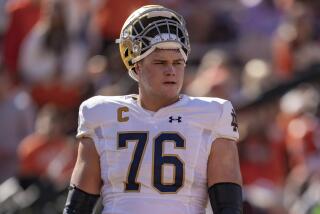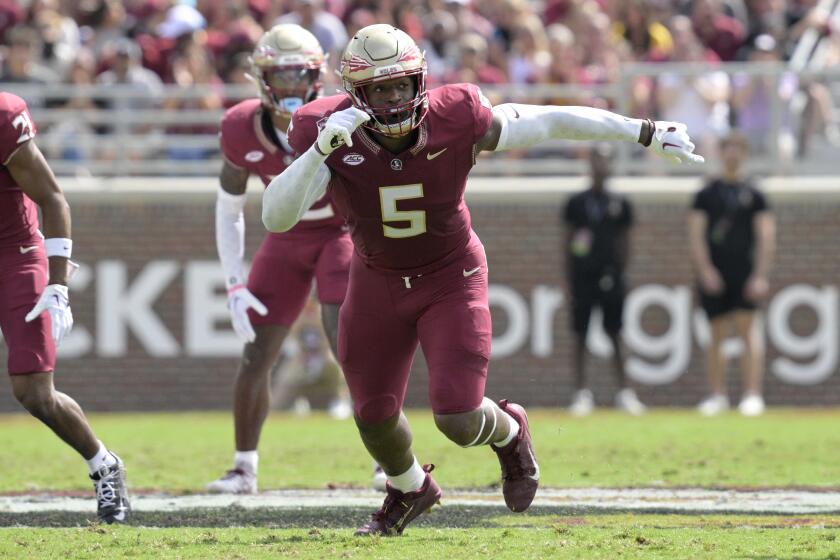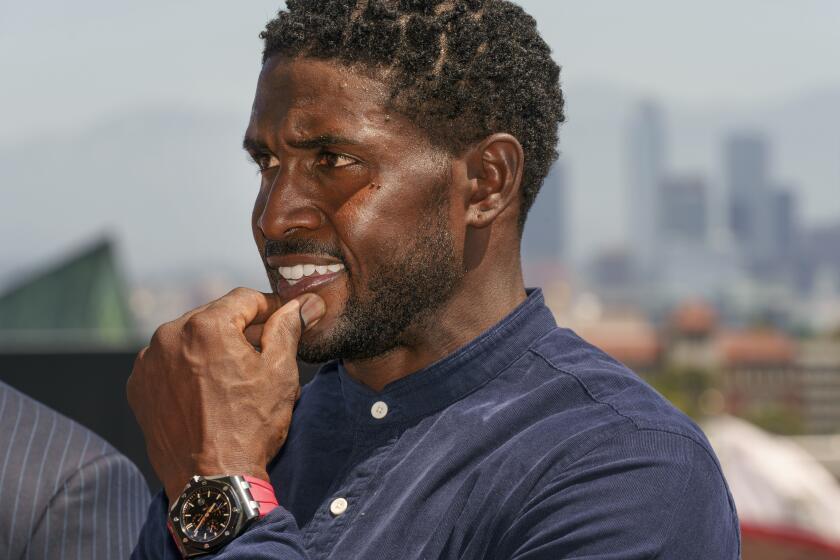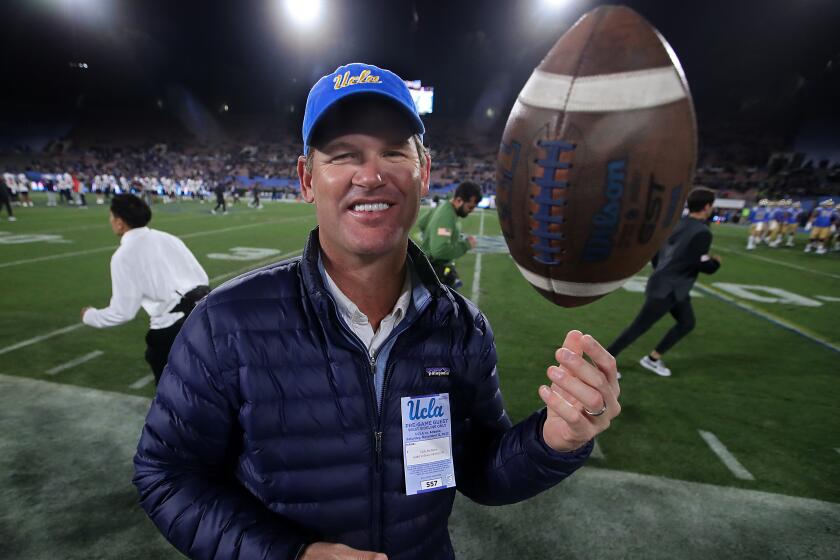WORLD SPORTS SCENE : Coe Claims England’s Seeding Undeserved, but Defends Move
As a sportsman and soccer fan, British miler Sebastian Coe realizes that England does not deserve the break it received Thursday when it was designated by the International Federation of Association Football as one of the six seeded teams for next summer’s World Cup in Italy.
But as a politician, which will become his primary calling upon his retirement from the track next month, Coe also realizes that doing the expedient thing is sometimes as important as doing the right thing.
In this case, it might even be the same thing.
“We need to balance the needs of the game with the realities of what can happen if England isn’t seeded,” said Coe, who stopped in Los Angeles Thursday on his way to San Diego, where he will serve as the starter in Balboa Park Saturday for the Kinney cross-country championships.
“We might have to give way to hooliganism and alter the rules when England doesn’t have great cause to be seeded. But in the interest of safety, we really don’t want English fans on Italy’s mainland.”
So, England has been exiled to the Italian island of Sardinia. Another island might have been more historically appropriate, but Elba does not have a stadium that meets the requirements of the World Cup.
In order, the other seeded teams announced by FIFA are host Italy, defending champion Argentina, Brazil, West Germany and Belgium. Based on its superior record in qualifying rounds, Spain should have been sixth. But FIFA officials said this week that the seedings would be based on performances in recent World Cups. As England was a quarterfinalist in 1986 and advanced to the second round in 1982, it reigned over Spain.
“We deserved the sixth position,” said Bert Millichip, president of the English Soccer Federation.
Chimed in Herman Neuberger, president of FIFA’s World Cup committee: “This is in no way a concession to English hooliganism.”
FIFA’s president, Joao Havelange of Brazil, revealed his choices for the seeded teams last week. England was not among them. As a result, British Sports Minister Colin Moynihan rushed to Italy to plead with the World Cup committee on behalf of England.
The scenario he presented apparently was too frightening to ignore. If England had not been seeded, the sites for its three opening-round World Cup games would have been determined by the blind draw, which will occur Saturday in Rome. The English could have drawn Cagliari, Sardinia, but odds were they would have landed in one of the mainland cities such as Rome, Milan, Turin, Naples or Verona.
As those cities offer convenient access from England, the potential for thousands of notoriously rowdy soccer fans pouring into them and creating havoc was making virtually everyone on the mainland nervous.
But with England seeded, FIFA was able to choose the site for its first-round games. It chose remote Sardinia, accessible only by boat or plane and probably too expensive for the majority of hooligans, many of whom seem to be young and unemployed.
Now everyone is happy, except for the Sardinians.
And the Spanish.
As their national team manager, Luis Suarez, said this week, “It seems the worse your fans behave, the better you are treated.”
The Spanish probably would have been satisfied with the solution offered Thursday by Coe.
“I’m a football fan, but if the English federation, the fans and the government cannot guarantee the people safety, I would not permit England’s presence in the World Cup,” Coe said. “You have to look at the damage done to our national prestige when these incidents involving our hooligans occur.”
That will not be a particularly popular statement in England. But Coe, 33, has indicated he might not be the sort of politician who says only popular things if he becomes a member of the House of Commons. The election will be held sometime within the next two years. He will finish his remarkable track career next month in the Commonwealth Games at Auckland, New Zealand, where he will run in the 800 and 1,500 meters. Then he will concentrate on running for office as a Conservative from the Falmouth and Camboren district in southwestern England.
As deputy chairman of the British Sports Council, Coe has been involved in formulating policies to deal with soccer hooliganism. He will continue in that role if he becomes a Parliament member because the problem has landed in the government’s lap.
The government’s response has been to suggest an elaborate membership system that would require fans to apply for identity cards before they can attend games. Undesirables would not receive cards. It is not the solution, Coe said, but it is a solution.
That is more than has been offered by the football federation, Coe said.
“Football has resolutely refused to accept that it is the problem,” he said. “The federation says that you can’t blame all of this on football. But it is football where it occurs. This doesn’t occur at shopping malls.”
Coe said he believes that the football federation should start cleaning up its act by cleaning up its stadiums. That includes requiring teams to provide numbered seats in areas where there now is standing room only.
“The football federation believes that everyone has to stand closely packed together because it’s the atmosphere that counts. But the stadiums, frankly, are disgusting in terms of courtesy and hospitality and also hygiene.
“There is no way that American fans would in any way put up with the kind of facilities that we have. The whole atmosphere here is different from England. We have barbaric conditions, which have kept many of the civilizing influences away, including women and children.”
The Italians believe they can show England the way. They have built some new stadiums and modernized others.
Meanwhile, a London Times poll last summer revealed that track and field has surpassed soccer as England’s most popular sport.
As much as he might like to believe that, Coe doubts it is true. But if it is, he said, it is not track and field’s gain as much as it is soccer’s loss.
“When I was 11 or 12, in the early ‘70s, my parents didn’t mind if I went to the games and stood on the terrace,” he said. “They never thought anything of it. It was what I did on Saturdays. But today, I would never allow my children to go unchaperoned to a game.”
More to Read
Get our high school sports newsletter
Prep Rally is devoted to the SoCal high school sports experience, bringing you scores, stories and a behind-the-scenes look at what makes prep sports so popular.
You may occasionally receive promotional content from the Los Angeles Times.






